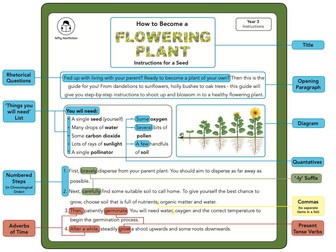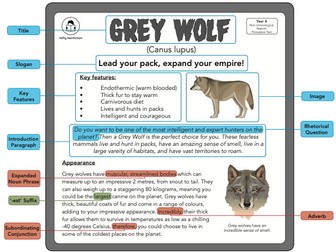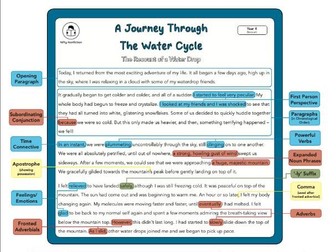Year 3 instructions model text - plants - Ebook
<p>How to Become a Flowering Plant - Instructions for a Seed - Ebook</p>
<p>Niftynonfiction - ‘Plants’ and Instructions (Year 3)</p>
<p>This cross-curricular model text teaching resource is a fun and humorous set of instructions, based on the life cycle of a flowering plant. It models the relevant Text Features, Grammar, Punctuation and Spelling Patterns for writing instructions at a Year 3 level.</p>
<p>This book also covers much of the content from the Year 3 Science unit ‘Plants’ from the National Curriculum, making it an ideal text to reinforce learning of the unit, and offering an opportunity to demonstrate an understanding of the content, through producing a similar piece of writing.</p>
<p>Photocopiable pages of the whole text are provided at the end of the book, with an annotated teacher’s guide, showing the Text Features, Grammar, Punctuation and Spelling Patterns used.</p>
<p>The National Curriculum statements covered, include:</p>
<p>Science - Plants (Year 3)</p>
<p>Pupils should be taught to:</p>
<p>• identify and describe the functions of different parts of flowering plants: roots, stem/trunk, leaves and flowers</p>
<p>• explore the requirements of plants for life and growth (air, light, water, nutrients from soil, and room to grow) and how they vary from plant to plant</p>
<p>• investigate the way in which water is transported within plants</p>
<p>• explore the part that flowers play in the life cycle of flowering plants, including pollination, seed formation and seed dispersal.</p>
<p>English, Writing - Composition (Year 3)</p>
<p>Pupils should be taught to plan their writing by:</p>
<p>• discussing writing similar to that which they are planning to write in order to understand and learn from its structure, vocabulary and grammar.</p>
<p>Pupils should be taught to draft and write by:</p>
<p>• organising paragraphs around a theme</p>
<p>• in non-narrative material, using simple organisational devices [for example, headings and sub-headings].</p>
<p>English, Writing - Vocabulary, grammar and punctuation (Year 3)</p>
<p>Pupils should be taught to develop their understanding of the concepts set out in English appendix 2 by:</p>
<p>• extending the range of sentences with more than one clause by using a wider range of conjunctions, including: when, if, because, although</p>
<p>• using conjunctions, adverbs and prepositions to express time and cause</p>
<p>• using fronted adverbials.</p>
<p>Pupils should be taught to indicate grammatical and other features by:</p>
<p>• using commas after fronted adverbials</p>
<p>• use and understand the grammatical terminology in English appendix 2 accurately and appropriately when discussing their writing and reading.</p>
<p>Suggested writing outcomes:</p>
<p>• Write own set of instructions for another real flowering plant.</p>
<p>• Write own set of instructions for a fictional flowering plant.</p>


